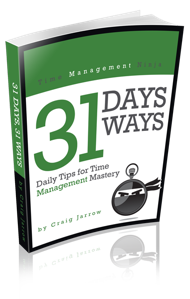
Do you find yourself constantly looking for pieces of information?
You can’t be productive if you are constantly searching for details that you already had. It’s like doing the same job over again.
Don’t let those little pieces of important information get away from you when you have the chance to capture them.
Don’t Let Important Details Get Away
It is frustrating when you have to search for the same information more than once. (Even worse, more than twice!)
The phone number that you just used last week. Or the solution to the problem that you solved before. Or that reference document that you were supposed to file.
Wasting time looking for details that you have already encountered isn’t fun, or productive. You should always try to catch them the first time they come your way.
“Always capture important information, and you won’t waste time looking for it again later.”
When you capture these facts the first time you encounter them, you will save time later.
Here are 8 Types of Information You Should Capture Every Day:
- Contacts – You would think in this age of Google and the Internet, you would be able to instantly find contact information. Yet, that is far from the reality. Always capture individual’s direct contact information when you encounter it. You never know when it will be valuable again in the future.
- Todos – Don’t forget that important, yet not urgent task. Add it to your todo list so that you won’t forget it, but can also keep concentrating on what you are doing now. Your todo list can remind you later.
- Solutions – When you solve a problem, save the steps and details in case you need to do it again down the road. I save solutions like this to Evernote in case I ever need them again.
- Big Ideas – Ever had one of those genius ideas… that you then forgot later? Those fleeting BIG ideas may never come again, catch them when they first cross your mind.
- Reading Material – Capture reading material for later. If you let every article, website, and tweet that comes your way distract you, you’ll never get your work done. Save them for future reading, during in-between times.
- Notes – This one may seem like a no-brainer. After all, isn’t that what notes are… information for later? Except, you would be amazed how many people don’t bother to take notes. Always take notes during important conversations and events.
- Shopping Items – Ever get back from the store just to realize that you forgot that one thing you thought of last week that you need? And then you head back to the store. Keep a running shopping list at all times so that you can easily capture shopping items when you think of them. I keep mine right inside my todo list in Wunderlist.
- Reference Information – These are pieces of information that are important but that you may not deal with on a regular basis. They can be simple things like sizes, product types, etc. Or they can be reference documents. Ensure you file them so you don’t have to dig for them later.
Always Capture Important Information
Capturing important information may seem like a chore when you are in the moment.
If you always do it, it will become a habit and second nature.
As well, you’ll thank yourself later when you save time not searching for the same information again.
Question: What types of information do you need to make sure you capture each day? You can leave a comment by clicking here. I am the author of Time Management Ninja and help individuals and companies reclaim their time to be more productive. As well, I am the author of the book
I am the author of Time Management Ninja and help individuals and companies reclaim their time to be more productive. As well, I am the author of the book 

These are some nice tips to save a little bit of extra time. Al the small bits count so I definitely try to capture these types of information. I need to fine tune the capturing process though, because my big ideas usually end up being noted down on the first empty page that I see, and this is not always the same page. Other information sometimes ends up uncaptured because of laziness. I am very strict with my todos though.
Multiple methods are necessary to capture the details. The method of recognising is an art to save more ME time.
Capturing information as it enters your life is essential to time management. Otherwise, notes are lost, and we spend time relocating info we already should have had. Of course, not just capturing is necessary, but also having a method to find the notes you’ve captured.
Capturing information as it enters your life is essential to time management. Otherwise, notes are lost, and we spend time relocating info we already should have had. Of course, not just capturing is necessary, but also having a method to find the notes you’ve captured.